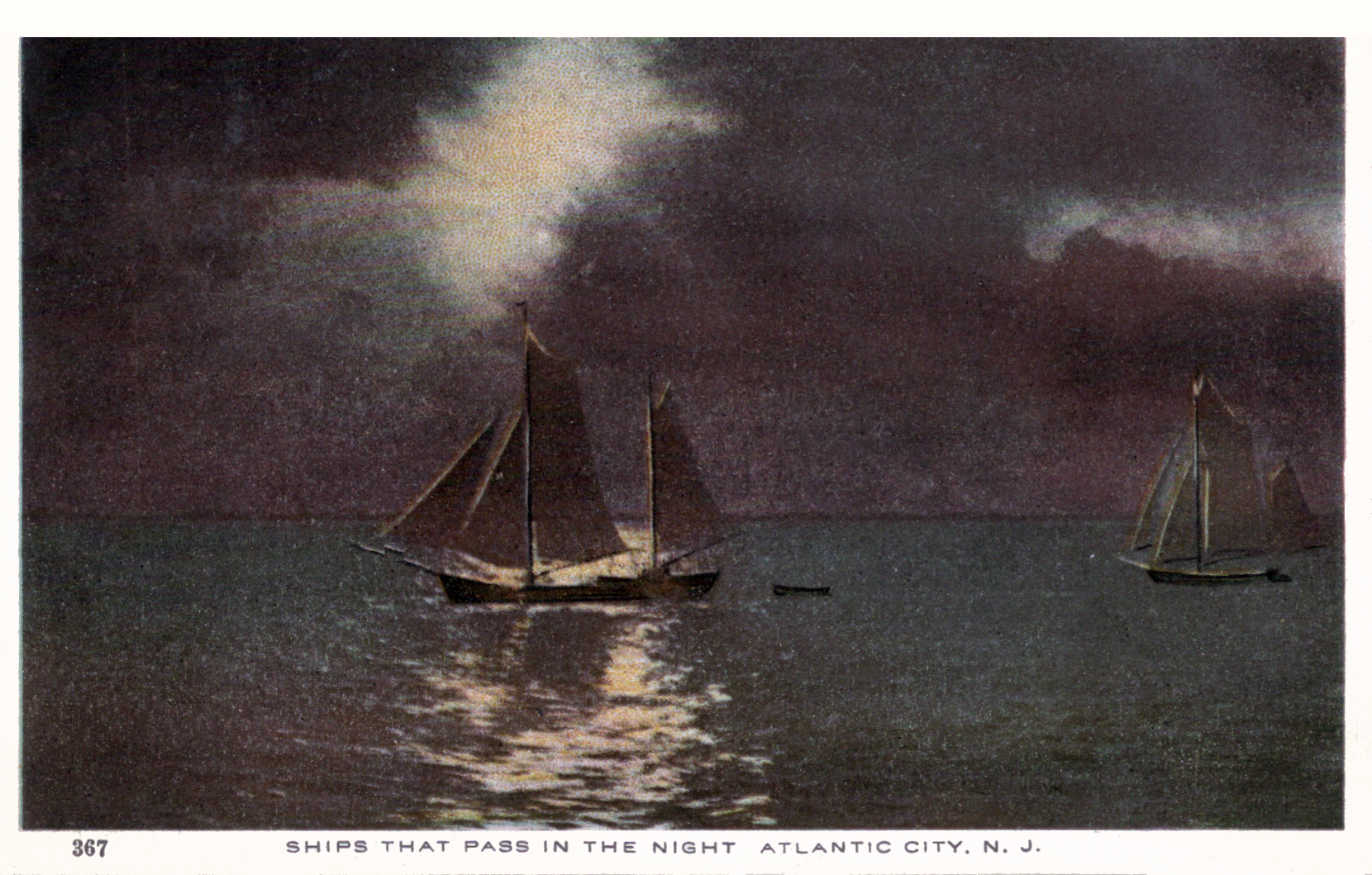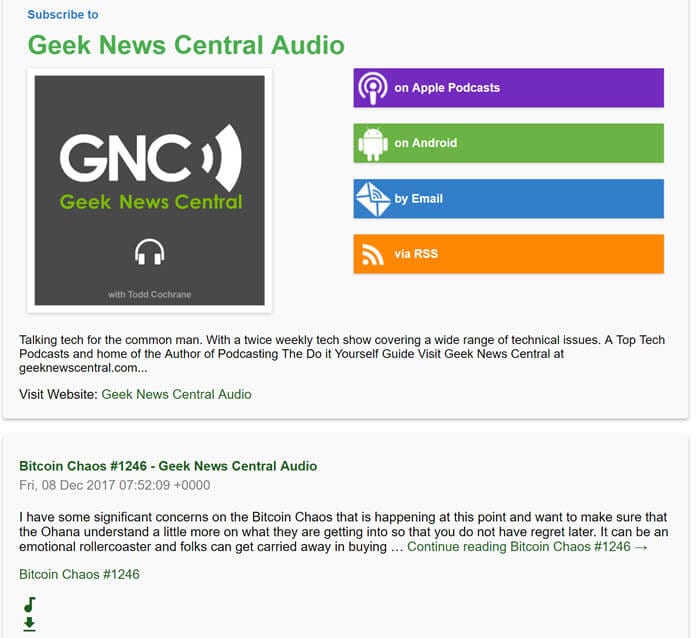
Full Answer
Why do I need a RSS feed for my podcast?
Submission Process:
- Go to the Google Play Music Podcast page.
- Click on “Publish”.
- Enter the portal using your Google Account. ...
- Read and accept the TOS (terms of service)
- For first time submissions, you will be redirected to the “New Podcast” page and asked to enter some information. ...
- Submit the RSS feed for your podcast and click on “Submit RSS Feed.”
What does it mean to subscribe to a RSS feed?
RSS [Really Simple Syndication] feeds are a very common way of allowing website users to keep track of new content. If you have subscribed to an RSS feed, every time new content is added to the page [s] covered by that feed, you’ll receive an alert. An example of an RSS icon.
How to host your own podcast RSS feed?
Why you may WANT to host your own podcast RSS feed
- Full ownership. When your podcast RSS feed is on your own domain, you fully own it. ...
- Total control. Hosting your podcast feed on your server opens up a world of possibilities for how you generate and manage that feed.
- Simple workflow. You should already have a platform for your podcast on a self-hosted website you own and control. ...
- Extendability. ...
What is RSS feed and how does it work [explained]?
RSS works by having the Web site author maintain a list of notifications on their Web site in a standard way. This list of notifications is called an RSS feed. People who are interested in finding out the latest headlines or changes can check this list.

How do I get an RSS feed for my podcast?
One of the links usually listed on the website for podcasts is the RSS feed. So look on the website for the podcast for that RSS feed. Most podcast websites will have a section called 'Subscribe' or 'Listen to our show. ' Look for this section.
Why do you need an RSS feed for a podcast?
An RSS feed is an essential piece of technology that powers every podcast. Without it, the medium wouldn't exist. A podcast RSS feed contains information about your show and its episodes. It then passes that information to podcast directories, like Apple Podcasts or Spotify, each time a new episode is published.
Are podcast RSS feeds free?
Switch to RSS.com now and enjoy 6 months free with unlimited features! Moving your podcast to RSS.com is fast and easy. Your show will be available during the transfer so your followers won't miss a thing.
What is the difference between a podcast and a RSS?
What Is the Difference Between a Podcast and an RSS? A podcast is an audio (and sometimes video) show that's published online and distributed via RSS feed to subscribers. The RSS feed is the link between the podcast audio/video files and the audience; it lets subscribers stay up-to-date with new podcast episodes.
Does Spotify use RSS feeds?
Up until now, show subscribers have only been able to play content in apps that support private RSS feeds, which Spotify does not. The platform doesn't rely on RSS feeds for its own exclusive shows, either, effectively locking them down to the platform.
Is RSS still used?
Is it still used online? Yes and no. RSS feeds are certainly still present (more on this later), but they aren't as dominant as they once were. Social media sites like Facebook, Twitter, LinkedIn, and others have become the go-to option for following sites, watching feeds, and learning about the latest content.
What is RSS and how do you use it?
An RSS (Really Simple Syndication) feed is an online file that contains details about every piece of content a site has published. Each time a site publishes a new piece of content, details about that content—including the full-text of the content or a summary, publication date, author, link, etc.
How does RSS work?
RSS works by having the Web site author maintain a list of notifications on their Web site in a standard way. This list of notifications is called an RSS feed. People who are interested in finding out the latest headlines or changes can check this list.
What is it?
RSS stands for “Really Simple Syndication.” Think of it as a newsfeed, or your Instagram feed - as posts are published, they become available for you to see. When a podcast episode is published, that information is added to the RSS feed, and the RSS feed is responsible for sharing and distributing that content to certain platforms.
Why is it useful?
An RSS feed takes the manual work out of adding your content to multiple platforms. Instead, it creates a more automated process - directories where you’ve syndicated your podcast to can read and monitor that feed. When new information is added, it will update accordingly.
Podcast Hosts
While you can create an RSS Feed on your own, podcast hosts will generate one for you. The RSS Feed URL is what connects directories to all of your content, so that listeners can access your podcast in listening apps.
What is an RSS feed?
A R ich S ite S ummary is a bunch of text that allows applications to access updates to websites.
Why do I need an RSS feed for my podcast?
Well, without an RSS feed apps will not be able to list your podcast and episodes.
How can I create a podcast RSS feed?
A feed isn't binary code. You can —kinda— read it and spot your podcast and episode's information (see below) but if you already knew about coding you wouldn't be here.
What items must my podcast RSS feed contain?
Okay, okay, you've read everything you need to know about how to start your podcast, go and start it now, your audience awaits for you!
What Is a Podcast RSS Feed?
Today, almost all websites provide at least one RSS feed. They’re most commonly used to subscribe to things like news sites, email lists, blogs, and—you guessed it—podcasts.
How to Create an RSS Feed for a Podcast
There are a few ways to get an RSS feed for your podcast. The easiest way is to choose a podcast hosting platform.
Where Can I Distribute My Podcast?
Once you’ve found or created your show’s RSS link, start submitting it to directories. If you want the best chance of having your show seen by as many people as possible, you need to submit your RSS feed to as many podcast directories as you can.
How to make a podcast on RSS?
Step 1. Create a free RSS Podcasting account. Step 2. Confirm your email address and select the “New podcast” button. Step 3. Next, add your new podcast’s details including title, description, and your RSS address feed and select “Next.”.
How to create RSS feed?
If you know how to code (most of us don’t), you can create an RSS feed by using XML to declare the channel, title of your feed, links to your channel, and more. You then will need to add a new item each time you create a new episode so that your episode will show up in your readers’ feeds.
How to get your podcast on iTunes?
Below are step-by-step guides to help you get your show published on the most popular podcast directories: 1 How to submit your podcast to iTunes/Apple Podcasts 2 How to submit your podcast to Google Podcasts 3 How to submit your podcast to Spotify 4 How to submit your show to Stitcher 5 How to submit your podcast to iHeartRadio 6 How to submit your podcast to TuneIn 7 How to submit your show to Pandora 8 How to submit your podcast to Amazon Music & Audible 9 How to start, grow, and monetize a podcast
Do I need a podcast feed?
Do I Need a Podcast-Only Feed? Yes. If you already have an RSS feed for your website, that’s great, but it isn’t going to do the job when it comes to your podcasts. Your site-wide RSS feed may only be picking up your blog posts and not your podcast episodes.

What Is An RSS feed?
- RSS stands for Really Simple Syndication. Syndication means the transfer of content from one organization to another. For example, when a TV sitcom’s reruns go into syndication, the original production company lets another tv network control the back catalog of episodes, and show the…
Here’s An analogy.
- Let’s say that your podcast is a train. The episodes are the individual train cars, packed with cool people and ideas. The RSS feed is the railroad track route, on which the train travels. The station is where people meet the train. The train chugs along from the railyard (the media host) along the route (the RSS feed) to the train station (the directory) where its friends (the podcast’s audience…
How Do Podcasters Use An RSS feed?
- Like I said before, it’s a computer-readable web feed. A person can’t “read” it. But, a podcast listening app or directory can decode it. You can use an RSS feed to: 1. Submit your podcast to directories. 2. Make audiograms on Headliner, to promote your show. 3. Make a podcast website, using Podpage. …and, in the future, probably more.
What About Youtube?
- If you want to have your podcast on YouTube, go for it!I heartily applaud your decision. It’s important, now more than ever, to diversify your podcast distribution and make sure it’s available wherever people consume content. Oh. Did you mean, onlyYouTube? Well, that’s fine. You can certainly upload videos with your audio files attached to YouTube and share them that way. I wis…
Why Are RSS Feeds Essential For Podcasting?
- RSS feeds are stable, standardized routes that information can use to travel where people need it. Posting your content within only one company’s system (such as “exclusive” podcasts, or within a social media platform) is limiting. Your podcast might be subject to the whims of the platform owner. If they pull up stakes and disappear one day, your content won’t reach its audience anym…
It’S A Url, and So Much More
- The humble RSS feed, that no one ever sees, is a uniform resource locator. It indicates a stable web feed, where information travels between creators and audience. It’s a beautiful thing. You’ll see it in your media host, and you might see it if you subscribe to a private podcast. More often than not, it works for you invisibly. Podcasting is both a science and an art form. It’s not difficult …